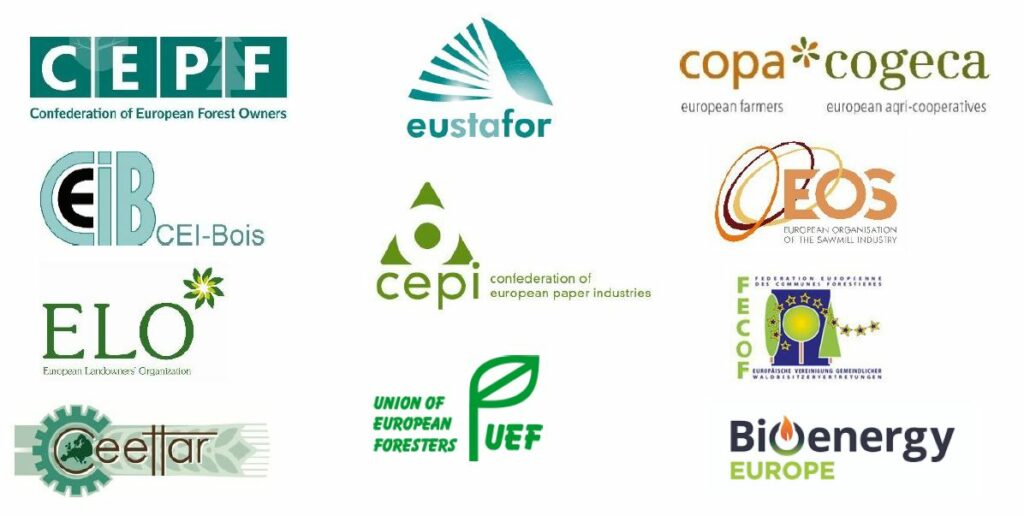Multifunctional European forests are crucial to reach the objectives of a European Green Deal
European forests, vital for climate, society, and nature, have steadily expanded and adapted. Sustainable management has met growing societal needs, including climate mitigation, hazard protection, recreation, and supporting biodiversity. It’s crucial to harmonize EU forest-related policies, giving due importance to sustainable forest management and the diverse roles forests play.
As representatives of European forests and the forest-based sector, we welcome the political guidelines of the President-elect of the Commission Ursula von der Leyen which aim to ensure the EU’s transition to a climate-neutral continent by 2050. Given that the roles of forests and forestry extend well beyond carbon neutrality, we strongly believe that our sector should be centrally positioned in the upcoming discussions on how to defossilize the European Union while, at the same time, ensuring the sustainable development of European society and the green growth of the European economy.
European forests are a steadily growing and dynamically evolving resource, serving climate, people and nature. Over the last decades, European forests have been managed sustainably, meeting European society’s growing demands for climate change mitigation, protection against natural hazards, recreational space, development of the bioeconomy and providing a home for biodiversity, to name just a few. It is, therefore, essential to ensure productive coordination and synergies among the various forest-related EU policies and to ensure that sustainable forest management and the multifunctional role of forests are provided with an appropriate role in this work.
We are deeply convinced that the main tool to integrate European forests and the forest-based sector into the Green Deal should be a robust EU Forest Strategy post-2020, as it provides a framework for a consistent and well-coordinated action at EU level. An update of the current strategy was already requested by the Member States in the Council Conclusions, by the Committee of the Regions and, several times, by forest sector stakeholders. We strongly believe that all these requests should be taken into account while making the announced European Green Deal a reality.
The European Green Deal will establish the European Climate Law which will enshrine the 2050 climate-neutrality target into law. In this context, the undersigned organisations would like to highlight that sustainable and active forest management plays an important role in reaching EU climate and energy policy objectives and targets. Sustainable and active forest management contributes to climate change mitigation and adaptation, improves energy security, creates jobs throughout the entire forest-based value chain and promotes economic growth. Sustainable forest management provides three main climate benefits: CO2 sequestration and carbon storage in resilient, growing forests; carbon storage in harvested wood products; and a renewable and climate-friendly raw material that substitutes for energy-intensive materials and fossil fuels. At the same time, changing climatic conditions cause serious and increasing threats to forests, such as droughts and heat waves, floods, pests and diseases, erosion and forest fires. These natural disturbances cause severe damage to forest ecosystems, human well-being and the provision of ecosystem services, including suitable raw materials for downstream forest industries.
Sustainable forest management and its principles and tools have already been defined in a comprehensive manner by the Forest Europe process. The definition includes nature conservation and biodiversity and was agreed on as a policy concept by the European Union and all of its Member States. It can, therefore, serve as a point of reference for various EU policy sectors and serve as the backbone of the European Green Deal. Any EU legislation which might impact forests or the forestry sector, should make full use of already-existing instruments before developing yet another system to address sustainability and biodiversity in forests.
A transparent and inclusive multi-stakeholder platform is needed in order to find appropriate solutions for the many challenges related to forests and forest management at EU level. We believe this can be achieved through the strengthened Council Working Party on Forestry, the Standing Forestry Committee and the Civil Dialogue Group on Forests and Cork. These groups can and should address the entire scope of the multifunctionality of forests and forestry and should operate within the framework already established by the EU Forest Strategy. These bodies should also be used for the coordination of positions delivered on behalf of the Union during forestry-relevant international dialogues.
The undersigned organisations take this opportunity to strongly reiterate that, alongside the EU Biodiversity Strategy to 2030, it is essential to update the EU Forest Strategy and to give it appropriate recognition as a part of the European Green Deal.
Sources
https://ec.europa.eu/commission/sites/beta-political/files/political-guidelines-next-commission_en.pdf
https://www.consilium.europa.eu/media/39173/ccs-on-forestry-st08609-en19.pdf
https://cor.europa.eu/en/news/Pages/The-EU-needs-a-new-forestry-strategy-to-harness-the-potential-of-the-bioeconomy.aspx
http://cepfeu.org/sites/default/files/Joint%20statement%20on%20forest%20strategy_final%20with%20CEJA%2C%20FECOF%2C%20EFFAT%2020190115%20%28002%29.pdf
https://foresteurope.org/sustainable-forest-management-implementation/
Signatories





